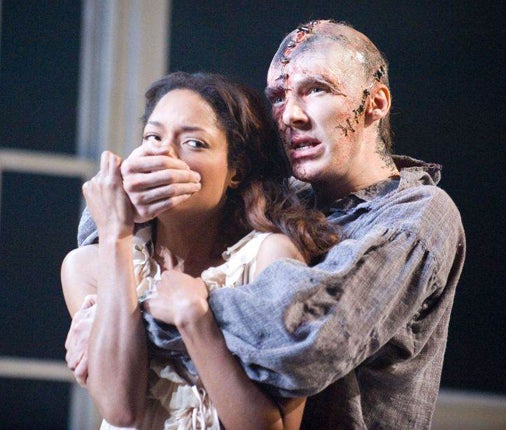Don't bother booking a drink – it's curtains for the interval
Snappier writing and shorter attention spans keep theatregoers in their seats

Jostling for space at the bar, consulting your partner for an intelligent opinion and unscrewing a £10 note to buy ice-cream could become a thing of the past in British theatres if a recent trend against intervals in musicals and plays continues.
A host of West End productions have dropped the convention of a mid-performance break. From Danny Boyle's Frankenstein, which opened last week at the National Theatre, to Million Dollar Quartet, which opens tonight at London's Noel Coward Theatre, shows are running straight through. The trend is mirrored in smaller theatres nationwide, as snappier writing and shortening attention spans spell the end of pre-ordered interval drinks.
"Directors would rather there was no interval, especially the younger ones who fondly imagine the audience to be gripped by their visions," said Chris Campbell, a literary manager at the Royal Court in London. "While theatres make a lot of money from intervals, there has to be a realistic assessment of what an audience wants from the rhythm of an evening."
Other recent plays without intervals include Leslie Jordan: My Trip Down the Pink Carpet at the Apollo, The 25th Annual Putnam County Spelling Bee at the Donmar Warehouse, The National Theatre's Danton's Death, Alan Ayckbourn's Snake in the Grass at the Print Room, Enda Walsh's Penelope and The Barbican Theatre's Antonioni Project.
When Yasmina Reza's Art opened in the West End in 1996, some audience members complained that they were not getting their money's worth because it was 90 minutes long without a break. The Independent's theatre critic Paul Taylor said that most plays retained intervals even though the historical reason for them has been lost. "There were no intervals at Shakespeare's Globe, and they only had them when the theatre moved to Blackfriars because it allowed time to light candles," he said. "A Winter's Tale is structured around that."
Mark Shenton, a theatre critic for The Stage magazine, said: "It is a definitely a trend. The world moves much faster these days. People want a quick fix and then to go on to something else. They don't want to devote three hours of their evening to one thing."
At smaller venues, where audiences scarcely have room to stretch their legs, intervals are often greeted eagerly, though they are less common. "Artistically, there is a trend towards shorter, one-act plays and that must be influenced by other media," said Paul Robinson, who with Tim Roseman artistically directs Theatre503 in Battersea. "It also depends on your budget. If you can only afford four actors that will affect the length of your play."
Roseman and Robinson do not earn revenues from breaks. Coming to a play, they say, is much more about "sitting on a comfy sofa and hanging out with the cast after a performance."
Plenty of other plays still split down the middle. The Royal Court's Clybourne Park, at Wyndham's Theatre, depends on it for a change of scenery. After a hiatus the action fast-forwards 50 years from 1959 to 2009, with the same actors playing different roles.
Gregory Doran's 2008 Hamlet broke for an interval to create a cliff-hanger as the tragic hero raised a dagger above his uncle's head. Rupert Goold's 2007 Macbeth interrupted the play halfway through the dinner party and returned to replay the same moments from a different perspective.
"There are arguments for and against intervals," said Campbell. "When people have been at work all day and they've dashed in and just had time to take their seats, it is more popular with the public than it is with some theatre professionals."
Subscribe to Independent Premium to bookmark this article
Want to bookmark your favourite articles and stories to read or reference later? Start your Independent Premium subscription today.

Join our commenting forum
Join thought-provoking conversations, follow other Independent readers and see their replies